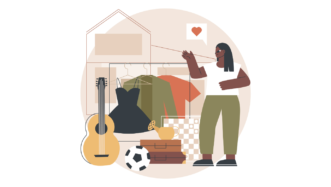LESSON OVERVIEW
The main objectives of this lesson are to:
- talk about personal experience and preferences,
- provide arguments in support of or against opinions,
- give advice.
Students practise talking about cooking in English. They assess their cooking skills and rate the difficulty of cooking tasks. They also watch a cooking class ad and talk about people who want to cook for a living.
B1 / Intermediate45 min
60 minSpeaking ClassUnlimited Plan
This is a Speaking Class worksheet. It includes a variety of tasks that let your students practise their speaking skills. This lesson format does not focus on grammar or vocabulary. Learn more about it here.
WARM-UP & SHARING EXPERIENCES
First, students choose a statement that best describes their cooking skills. Then, you can choose to ask students to do an additional vocabulary activity. In it, they need to come up with examples for some categories (e.g. meal, course, dish). The activity is available in the teacher’s version of the pdf as well as in the e-lesson plan (in a skipped slide). After that, students look at some activities (e.g. bake bread, invent a new dish) and share which of them they have tried and how it went. Students also practise talking about cooking in English in the next activity. They need to rate tasks (e.g. following a 15-step recipe, making a birthday cake) from the most to the least difficult.
VIDEO & DISCUSSION
In this part of the lesson, students watch the ad about an Italian cooking class and explain why they would or wouldn’t like to participate in the class. Then, they spend time talking about cooking in English. First, they discuss questions about cooking shows, professional chefs and restaurateurs. Then, they read comments made by people who want to cook for a living and give some advice. They also answer some questions regarding the comments. Finally, students read eight statements about cooking. They are about cooking being a hobby or a chore, cooking as a form of art and eating with your eyes, etc. Students choose three of them and explain why they agree or disagree with them.
Subscribe to unlock these and many other Standalone lesson lesson plans with the Unlimited planWORKSHEETS













It was a perfect last-minute activity, after the client told me (reminded me actually) that he LOVES cooking. Thank you! 🙂
Thanks, Dana! That’s fantastic 🙂
Hello, I love your lesson plan, I know two of them: this about cooking and about money “How much does it cost”. Are there more?
All the best,
Dorota
Hi, Dorota! I’m delighted to hear you liked the lesson 🙂 Yes, there are more, but I wouldn’t be able to list all of them here. I would check out lessons by other authors too if I were you!
Yes yes, the others are good too:)